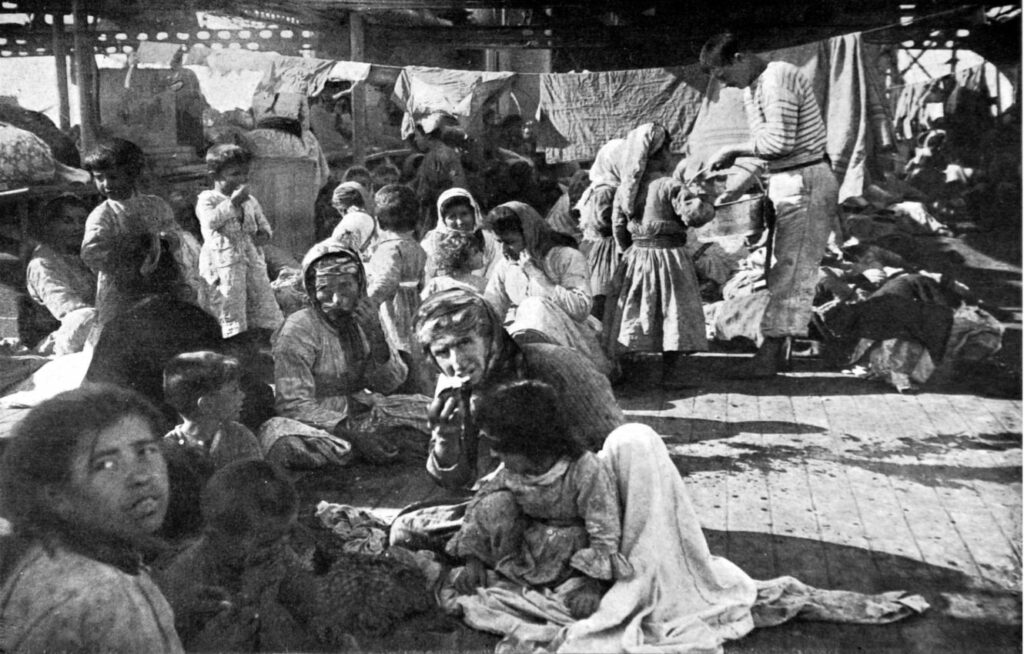Calls Armenian Killings “Genocide”
By Harut Sassounian
Israel’s new Ambassador to the United States, Michael B. Oren, is a firm believer in the veracity of the Armenian Genocide, despite his government’s denialist position on this issue.
Prior to his ambassadorial appointment, Oren repeatedly confirmed the facts of the Armenian Genocide in his writings. In the May 10, 2007 issue of the New York Review of Books, he wrote a highly positive review of Taner Akcam’s book: “A Shameful Act: The Armenian Genocide and the Question of Turkish Responsibility.” The review was titled: “The Mass Murder They Still Deny.”
In his most recent book, “Power, Faith and Fantasy,” Oren made dozens of references to Armenia and Armenians, including lengthy heart-wrenching descriptions of the mass killings before and during the Armenian Genocide. Here are some of the most striking quotations from his book:
“The buildup of Ottoman oppression and Armenian anger erupted finally in the spring of 1894, when Turkish troops set out to crush a local rebellion, but then went on to raze entire villages and slaughter all of their inhabitants…. Some 200,000 Armenians died — 20 percent of the population — and a million homes were ransacked. ‘Armenian holocaust,’ cried a New York Times headline in September 1895, employing the word that would later become synonymous with genocide.”
Oren then went on to establish that more than a century ago, similar to today’s acrimonious political tug-of-war over the genocide recognition issue, the Armenian atrocities seriously affected U.S.-Turkish relations. He wrote: “Maintaining amicability with Turkey would prove complicated, however, because ties between the United States and the Porte [Sultan] had long been frayed. The perennial source of friction was the oppression of Armenian Christians. Though a band of modernizing Young Turks, many of them graduates of Roberts College, had achieved power in Istanbul in 1908 and promised equal rights for all of the empire’s citizens, barely a year passed before the slaughter of Armenians resumed. Some thirty thousand of them were butchered by Turkish troops in south-central Anatolia.”
In a section titled, “The most horrible crime in human history,” Oren wrote: “The first reports, from December 1914, told of anti-Christian pogroms in Bitlis, in eastern Turkey, and the hanging of hundreds of Armenians in the streets of Erzerum. Armenian men between the ages of twenty and sixty were being conscripted into forced-labor battalions, building roads, and hauling supplies for the Turkish army. The following month, after their defeat by Russian forces in the Caucasus, Turkish troops salved their humiliation by pillaging Armenian towns and executing their Armenian laborers. In the early spring, Turkish soldiers laid siege to the Armenian city of Van in eastern Anatolia and began the first of innumerable mass deportations. The slaughter then raged westward to Istanbul, where, on April 24, security forces arrested and hanged some 250 Armenian leaders and torched Armenian neighborhoods. Interior Minister Talaat Pasha informed the Armenian Patriarch that ‘there was no room for Christians in Turkey’ and advised him and his parishioners ‘to clear out of the country.'”
Oren then exposed Turkey’s attempts to falsify history by pointing out that: “Most contemporary observers agree that the massacres were scarcely connected to the war, but rather represented a systematically planned and executed program to eliminate an entire people. Indeed, foreshadowing the Nazi genocide of the Jews twenty-five years later, Turkish soldiers herded entire Armenian villages into freezing rivers, incinerated them in burning churches, or simply marched them into the deserts and abandoned them to die of thirst…. By the end of summer, an estimated 800,000 Armenians had been killed and countless others forcibly converted to Islam.”
After citing numerous eyewitness accounts of the mass killings, Oren concluded: “In all, as many as 1.5 million Armenians were killed in a genocide that the Turkish government would never acknowledge, much less regret.”
While it is true that Michael Oren published this book before his assignment as Ambassador to Washington, his compelling position on the Armenian Genocide would hopefully make him refrain from following the footsteps of his predecessors who shamefully lobbied against the congressional resolution on this issue.
The appointment of a staunch supporter of the truth of the Armenian Genocide as Israel’s Ambassador to Washington comes on the heels of a serious rift between Turkey and Israel following the Gaza war earlier this year. On that occasion, there were major manifestations of anti-Semitic statements and acts throughout Turkey, including anti-Israeli remarks by Turkish Prime Minister Rejeb Erdogan. His insulting words to Israel’s President Shimon Peres in Davos, Switzerland, antagonized Israelis and Jews worldwide. Even though Israel downplayed Erdogan’s offensive words, they did a lasting damage to Israeli-Turkish relations.
The combination of an Israeli government that is less sympathetic of Turkey and the presence of Israel’s Ambassador in Washington who is a firm believer in the facts of the Armenian Genocide may facilitate the passage of the pending congressional resolution on the Armenian Genocide.
